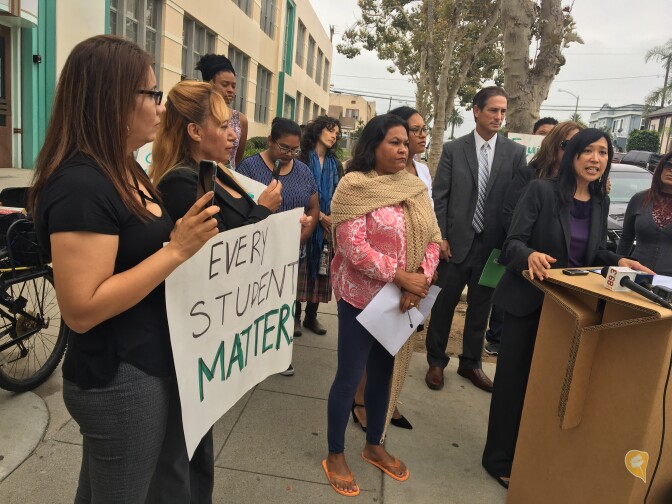This story is free to read because readers choose to support LAist. If you find value in independent local reporting, make a donation to power our newsroom today.
This archival content was originally written for and published on KPCC.org. Keep in mind that links and images may no longer work — and references may be outdated.
Activists ramp up complaints about Long Beach Unified's spending on high-needs students

A coalition of parents and activists elevated their dispute with the Long Beach Unified School District this week, asking California Department of Education officials to rule whether the district is improperly spending millions in state funding intended to help poor and high-needs kids.
The escalation draws fresh attention to a fundamental disagreement about how the state's five-year-old school funding law, the Local Control Funding Formula, or "LCFF," ought to work.
Under that law, students in three high-need groups of students — low-income kids, foster youth and English learners — generate additional state funding for their schools. In turn, school officials are supposed to spend that money on programs addressing the specific needs of students from these three groups.
In their appeal filed with state officials on Wednesday, activists accuse Long Beach Unified of redirecting a portion of the state funding these high-need students generate — some $31 million — to cover more general expenses rather than targeted programs.
So what distinguishes a "targeted" program from an expenditure benefiting all students? Long Beach Unified officials contend that in a district where 70 percent of students fit into at least one of these high-need groups, even spending not "targeted" at these students still probably benefits them.
"The appellants' arguments are weak," district spokesman Chris Eftychiou said in an interview, "because they're trying to make … the LCFF into something that it's not. They've imagined burdens not imposed by the law and claimed that we failed those imagined burdens. If the state follows the law, we should prevail."
But the activists' attorney, Angelica Jongco, argues the district's obligation to spend funds on low-income students, foster youth and English learners is central to the state law.
Since 2013, as Gov. Jerry Brown and state lawmakers promised, the new school funding formula has increased the state's spending on K-12 education by $12.8 million. But in exchange for the extra funding — and some additional flexibility in how to spend it — lawmakers said school districts would need to spend the additional money generated under this law on targeted services for those three high-need groups.
"A district like Long Beach — that serves a lot of high-needs students — also receives a lot more money than other districts that don't," said Jongco, who works for the non-profit law firm Public Advocates. "There's a lot of responsibility that comes with that funding."
The activists had filed a complaint in April, accusing Long Beach Unified officials of misspending a larger sum — roughly $40 million — they feel should have been spent on low-income students, foster youth and English learners.
Long Beach Unified has since shifted its spending, significantly reducing the amounts of funding generated by these high-needs students — known as "supplemental and concentration" dollars — that gets spent on teacher salaries and on technology costs.
But the activists felt the district could do better. Their appeal says Long Beach Unified officials have failed to justify spending $14.5 million in funding generated by high-needs students on instructional aides, and another $17 million of these dollars on district-wide textbook purchases.
In an interview, Long Beach Unified's Robert Tagorda defended the use of supplemental and concentration dollars on these expenditures. He argued the textbook expenditure is actually for software that specifically helps English learners — one of the high-need groups state law identifies. The instructional aides, he added, also directly benefitted students struggling with English or math.
"By assigning these instructional aides to support our classroom teachers," said Tagorda, the district's Director of Equity, Access, College and Career Readiness, "their job predominantly is to help the neediest kids in those classrooms. From our vantage point, that actually precisely upholds the spirit of LCFF."
But textbooks are fundamental to all students learning, Jongo argued, saying activists found it difficult to understand how such a basic expenditure required the use of these special, earmarked funds.
Jongco also noted an outside investigator the instructional aides' job descriptions did not clearly tie them to helping high-needs students.
The dispute in Long Beach closely mirrors a dispute in the neighboring Los Angeles Unified School District, where Public Advocates and ACLU attorneys — including Jongco — represent a separate coalition of parents and advocacy groups in a lawsuit against the district over its use of funding generated by high-needs students.
L.A. Unified School Board members have authorized district officials to negotiate a settlement in that case, which will likely result in the spending of millions in additional dollars at district campuses. The settlement, though, has not yet been finalized.







